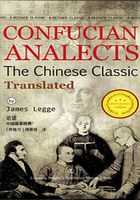
CHAPTER 14
The Master said, "He who aims to be a man of complete virtue, in his food does not seek to gratify his appetite,
12. IN CEREMONIES A NATURAL EASE IS TO BE PRIZED, AND YET TO BE SUBORDINATE TO THE END OF CEREMONIES,—THE REVERENTIAL OBSERVANCE OF PROPRIETY. 1. 礼 is not easily rendered in another language. There underlies it the idea of what is proper. It is 事之宜, 'the fitness of things', what reason calls for in the performance of duties towards superior beings, and between man and man. Our team 'ceremonies' comes near its meaning here. 道 is here a name for 礼, as indicating the courses or ways to be pursued by men. In 小大由之, the antecedent to之is not 和, but 礼 or 道. 2. Obs. the force of the 亦, 'also', in the last clause, and how it affirms the general principle enunciated in the first paragraph.
13. TO SAVE PROM FUTURE REPENRANCE, WE MUST BE CAREFUL IN OUR FIRST STEPS. A diff. view of the scope of this ch. is taken by Ho An. It illustrates, according to him, the difference between being sincere and righteousness, between being respectful and propriety, and how a man's conduct may be venerated. The later view commends itself, the only difficulty being with 近于, 'near to', which we must accept as a meiosis fro 合乎, 'agreeing with'. 约=信约, 'a covenant', 'agreement'. 远, up. 3d tone, 'to keep away from'. The force of the 亦= 'he can go on to make them his masters', 宗 being taken as an active verb.

nor in his dwelling-place does he seek the appliances of ease; he is earnest in what he is doing, and careful in his speech; he frequents the company of men of principle that he may be rectified:-such a person may be said indeed to love to learn."